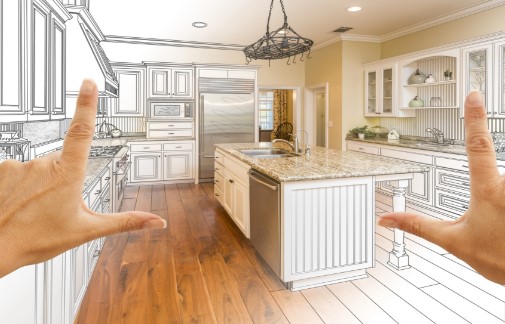The Role of Landscaping in Complete Home Renovations

When homeowners undertake a complete renovation, much of the focus is often on interior design, new appliances, and structural upgrades. However, landscaping is equally important in transforming a house into a more attractive and functional space. Properly designed landscaping in Burlingame can enhance curb appeal, create outdoor living areas, and improve the property’s overall value. We will explore the role of landscaping in complete home renovations, discussing how it enhances visual appeal, promotes outdoor functionality, and integrates with the home’s architectural style.
Role of landscaping in renovations
- Enhancing Curb Appeal and First Impressions
One of the primary roles landscaping plays in a home renovation is enhancing curb appeal. A home’s exterior is the first thing people notice, and well-planned landscaping can make a lasting impression. Through well-maintained lawns, colorful flower beds, or strategically placed trees, landscaping helps frame the home visually appealing. For homeowners looking to sell their renovated property, curb appeal is especially important because it sets the tone for potential buyers when they arrive.
Even simple landscaping improvements like adding fresh mulch, trimming hedges, and planting seasonal flowers can dramatically improve a home’s exterior appearance. More extensive upgrades, such as installing a new walkway, garden lighting, or a retaining wall, can further enhance the property’s overall aesthetic. By creating a welcoming, attractive outdoor environment, landscaping elevates the home’s curb appeal and creates a sense of pride for homeowners.
- Creating Functional Outdoor Living Spaces
In modern home renovations, outdoor living spaces are increasingly becoming a key focus. Homeowners seek to expand their usable living areas beyond the house’s walls, and landscaping is crucial in making this possible. Well-designed outdoor spaces, such as patios, decks, or garden seating areas, provide additional functionality and allow homeowners to enjoy their yards for relaxation, entertainment, and family gatherings.
Landscaping can define different zones in an outdoor space, such as dining areas, lounges, or play spaces for children. Features like outdoor kitchens, fire pits, or pergolas can make the yard an extension of the home’s interior, allowing for year-round use. Properly selected plants and trees can offer shade, privacy, and protection from the elements, making the space more comfortable and enjoyable.
Incorporating these outdoor living areas into a renovation plan improves the homeowners’ lifestyle and adds significant value to the property. A functional, well-designed outdoor space can make a home more desirable to potential buyers, especially in regions where outdoor living is a major part of the lifestyle.
- Integrating Landscaping with Architectural Style
A complete home renovation often includes updating the house’s exterior, such as replacing siding, windows, or doors. Landscaping is critical in ensuring the outdoor environment complements the home’s architectural style. Whether the house is a modern design with clean lines or a more traditional style with classic features, the surrounding landscape should harmonize with the overall look and feel of the property.
For example, a contemporary home might benefit from minimalist landscaping with sleek walkways, geometric hedges, and simple plantings that align with the clean, modern aesthetic. In contrast, a Victorian-style home might look more cohesive with a lush garden featuring ornate wrought-iron accents, colorful flower beds, and a mix of shrubs and trees that evoke a traditional, timeless appeal.
Landscaping can soften hard architectural lines, add texture to the property, and create a seamless transition between the home and its natural surroundings. By carefully selecting plant species, materials, and design elements that reflect the house’s style, landscaping becomes an extension of the home’s character and charm.
- Improving Property Value and Marketability
Another important role landscaping plays in a complete home renovation is increasing the property’s overall value. As interior upgrades such as new kitchens or bathrooms can boost a home’s resale value, a well-designed landscape can significantly increase the property’s marketability. According to various real estate studies, homes with attractive landscaping sell faster and at higher prices than those with neglected or unfinished exteriors.
A beautifully landscaped yard makes a home more appealing to potential buyers and offers a sense of completion. When the interior and exterior have been thoughtfully renovated, buyers are more likely to perceive the home as well-maintained and move-in ready. Features like well-manicured lawns, mature trees, and functional outdoor spaces signal that the homeowner has invested in the property, which can lead to a higher perceived value.
Investing in landscaping also benefits homeowners planning to stay in their renovated home long-term. A well-designed yard can lower maintenance costs, reduce water consumption, and even improve energy efficiency by providing natural shade to the home. These benefits make landscaping an investment that continues to pay off financially and functionally over time.
Read also: Navigating Your Homeowner’s Insurance: What’s Covered and What’s an Out-of-Pocket Expense?
- Environmental and Sustainability Benefits
Incorporating sustainable landscaping practices into a home renovation can further enhance the property’s appeal and functionality. Landscaping is important in managing water runoff, reducing erosion, and promoting biodiversity. By choosing native plants that require less water and are well-suited to the local climate, homeowners can create a more sustainable and low-maintenance landscape.
Other eco-friendly landscaping features include rain gardens, permeable paving, and xeriscaping, which focuses on using drought-tolerant plants to reduce water usage. These features not only contribute to the overall aesthetic of the property but also support environmental sustainability. In addition, well-placed trees and shrubs can provide natural insulation for the home, helping to reduce heating and cooling costs.
Homeowners who incorporate sustainable landscaping practices into their renovation plans can enjoy the dual benefits of a beautiful yard and reduced environmental impact. As sustainability awareness grows, these features become more attractive to environmentally conscious buyers, further boosting the home’s resale value.
Landscaping is vital in complete home renovations, enhancing the property’s visual appeal and functionality. From boosting curb appeal to creating outdoor living spaces and increasing marketability, landscaping contributes significantly to the overall success of a renovation. By integrating landscaping with the home’s architectural style and incorporating sustainable practices, homeowners can create a cohesive and inviting environment that adds lasting value to their property. Whether planning to sell or stay in the home long-term, investing in quality landscaping is essential to any comprehensive renovation project.




